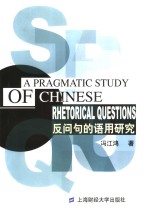

反问句的语用研究PDF电子书下载
- 电子书积分:10 积分如何计算积分?
- 作 者:冯江鸿著
- 出 版 社:上海:上海财经大学出版社
- 出版年份:2004
- ISBN:7810981986
- 页数:250 页
前言 1
Abstract 1
Chapter 1 Introduction 1
1.0 Introduction 1
序 1
1.1 The rationale of the present study 3
1.2 Problems with the existing studies 5
1.3 Objectives of the present study 6
1.4 Methodology 7
1.5 Outline of the study 8
2.1 Studies on Chinese rhetorical questions 10
2.1.1 Rhetorical approaches 10
Chapter 2 Review of Relevant Literature 10
2.0 Introduction 10
2.1.2 Grammatical approaches 12
2.1.3 Pragmatic approaches 16
2.2 Overseas studies of rhetorical questions 33
2.2.1 Rhetorical approaches 33
2.2.2 Linguistic approaches 34
2.2.3 Pragmatic approaches 39
2.3 Summary 44
3.1 Methodology in the present study 46
Chapter 3 Research Methodology 46
3.0 Introduction 46
3.2 Description of the data 48
3.3 Summary 49
Chapter 4 Identification and Interpretation of Chinese Rhetorical Questions 51
4.0 Introduction 51
4.1 Theoretical background of the present approach 51
4.2 The identification of Chinese rhetorical questions 64
4.2.1 Previous definitions of Chinese rhetorical questions 65
4.2.2 Distinctive features of Chinese rhetorical questions 69
4.2.2.1 The discrepancy between the form and the Communicative function of rhetorical ques-tions 70
4.2.2.2 The polarity shift between the rhetorical ques-tion and its implied answer 78
4.2.2.3 The multiplicity in the communicative function of rhetorical questions 80
4.2.2.4 The indirectness and implicitness of rhetoricalquestions in conveying ideas 83
4.3 The interpretation of Chinese rhetorical questions 90
4.4 Summary 94
Chapter 5 Responses to Chinese Rhetorical Questions 97
5.0 Introduction 97
5.1 An overview of the previous approaches to answerhood 98
5.1.1 Kiefer's pragmatic approach to the study of answers 99
5.1.2 Grewendorf's practical application of the probability and decision theories to the study of answers 102
5.1.3 Stenstr?m's conversation-and discourse-analytical approach to the study of answers 103
5.1.4 Ilie's pragmatic study of the adequacy of answer-hood 105
5.1.5 A classification of responses to questions 109
5.2 Responses to rhetorical questions 111
5.2.1 An overview of response types 112
5.2.2 Types of responses to rhetorical questions 116
5.2.2.1 Implicit vs.explicit answers to rhetorical ques-tions 118
5.2.2.2 Explicit answers vs.replies to rhetorical ques-tions 122
5.2.3 Types of explicit answers to rhetorical questions 124
5.2.3.1 Addresser's answers to rhetorical questions 125
5.2.3.2 Addressee's answers to rhetorical questions 129
5.2.4 Types of replies to rhetorical questions 135
5.2.4.1 Addresser's replies to rhetorical questions 136
5.2.4.2 Addressee's replies to rhetorical questions 145
5.2.4.2.1 Acknowledging vs.non-acknowledging ad-dressee's replies 146
5.2.4.2.2 Addressee's replies conveying agreement vs.disagreement 148
5.2.5 Non-verbalized responses to rhetorical questions used as assertives 155
5.2.6 Responses to rhetorical questions used as directives 157
5.3 Redefining rhetorical questions 161
5.4 Summary 163
Chapter 6 Rhetorical Questions as Discursive and Argumentative Acts in Talk Shows 167
6.0 Introduction 167
6.1 About talk shows 168
6.1.1 Talk shows as a semi-institutional discourse 169
6.1.2 The question-response sequence in talk shows 171
6.2 Discursive characteristics of rhetorical questions in talk shows 177
6.3 The pragma-dialectical approach to argumentation 202
6.4 Argumentative use of rhetorical questions in talk shows 208
6.4.1 Argumentative patterns of rhetorical questions intalk shows 208
6.4.2 Rhetorical questions that function as standpoints 214
6.4.3 Rhetorical questions that function as arguments 217
6.5 Summary 219
7.0 Introduction 222
Chapter 7 Conclusion 222
7.1 Summary of the findings 223
7.1.1 Major findings in the identification of chinese rhe-torical questions 223
7.1.2 Major findings in the responses to Chinese rhetorical questions 224
7.1.3 Major findings in the investigation of Chinese rhe-torical questions as di scursive and argumentative acts in talk shows 228
7.2 Theoretical and practical implications 229
7.3 Limitations of this study 231
7.4 Suggestions for future research 232
Appendix 1 Sources of rhetorical questions in the corpus 233
Appendix 2 Secimen analyses of rhetorical questions in corpus 235
Bibliography 239
- 《红色旅游的社会效应研究》吴春焕著 2019
- 《汉语词汇知识与习得研究》邢红兵主编 2019
- 《生物质甘油共气化制氢基础研究》赵丽霞 2019
- 《东北民歌文化研究及艺术探析》(中国)杨清波 2019
- 《联吡啶基钌光敏染料的结构与性能的理论研究》李明霞 2019
- 《异质性条件下技术创新最优市场结构研究 以中国高技术产业为例》千慧雄 2019
- 《《国语》和《战国策》词汇比较研究》陈长书著 2017
- 《中国制造业绿色供应链发展研究报告》中国电子信息产业发展研究院 2019
- 《行政保留研究》门中敬著 2019
- 《新课标背景下英语教学理论与教学活动研究》应丽君 2018
- 《迈向意义的世界-生存论哲学视野下的课程诠释》苏鸿著 2017
- 《改革潮头鼓呼集 下》施芝鸿著 2019
- 《脑科学攻略》顾鸿著 2018
- 《管理会计实训教程》彭波,江鸿漩主编 2017
- 《管理会计基础》罗艳琴,江鸿漩主编 2017
- 《少年图案装饰入门》岳志忠,吴运鸿著 1996
- 《色彩心理学 COLER PSYCHOLOGY》朗德森,孟鸿著 2010
- 《程序设计基础》吴良杰,郭江鸿,魏传宝等主编 2012
- 《乾隆皇帝 第2册 全本》叶赫那拉·图鸿著 1996
- 《乾隆皇帝 第4册》叶赫那拉·图鸿著 1996
